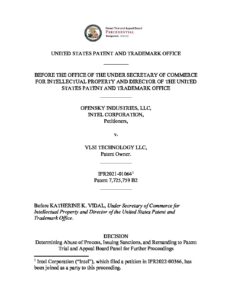By J. Karl Gross
Katherine Vidal, director of the United States Patent and Trademark Office (“USPTO”), recently acted twice to address abuses of the inter partes review (“IPR”) process. On September 21, Director Vidal issued an open letter responding to two senators to address their concerns over potential misconduct during IPR proceedings. Director Vidal’s letter summarized the USPTO’s authority under 37 C.F.R. § 42.12 to impose sanctions on a party for a range of misconduct, including the catchall “other improper use of the proceeding.” The letter noted that sanctions have been raised in at least 59 proceedings including 13 instances where the Patent Trial and Appeal Board (“PTAB”) itself sanctioned a party. The sanction penalties ranged from termination of the proceedings to awarding attorney fees. Director Vidal also stated that she planned to seek further input from patent holders and interested parties to address abuses of the IPR process.
Then, on October 4, Director Vidal issued a precedential ruling sanctioning IPR petitioner OpenSky Industries LLC in an IPR proceeding challenging U.S. Patent No. 7,725,759 (“the ’759 patent”) owned by VLSI Technology LLC. The OpenSky matter originated in April 2019 when VLSI sued Intel Corporation for infringement of the ’759 patent in the District Court for the Western District of Texas. Intel responded by filing two IPR petitions challenging the ’759 Patent. However the PTAB, relying on its discretion, denied institution of those proceedings in view of the advanced stage of the Texas litigation. The Texas case proceeded to trial, and the jury awarded VLSI $675 million for Intel’s infringement of the ’759 patent.
On June 7, 2021, shortly after the Texas verdict, OpenSky filed its own IPR petition asserting that certain claims of the ’759 patent were invalid. OpenSky alleged that it was seeking to protect “the integrity of the patent system” by challenging the ’759 patent. However, rather than prepare its own petition, “OpenSky copied extensively from Intel’s two earlier petitions.” Moreover, OpenSky refiled Intel’s expert witness declarations without the expert’s knowledge.
Understandably concerned, VLSI filed a Patent Owner Preliminary Response in part questioning OpenSky’s motivation in filing the petition, noting that OpenSky as a corporate entity was formed shortly after the widely reported Texas verdict and that OpenSky had no known business activity other than to file the IPR petition. The PTAB, however, concluded that OpenSky had shown a reasonable likelihood that certain claims of the ’759 patent were invalid and instituted the IPR trial. Intel, who was otherwise time-barred from filing another petition, requested to be joined to the OpenSky IPR, which the PTAB granted.
The real reason for OpenSky’s petition came to light when OpenSky approached VLSI and offered to undermine the IPR proceeding in exchange for payment from VLSI. OpenSky’s counsel sent VLSI an email offering that the “[p]arties agree to work together to secure dismissal or defeat of the petition” and that “OpenSky refuse to pay expert for time at deposition so expert does not appear for deposition.” When VLSI turned down OpenSky’s offer, OpenSky approached Intel seeking monetary payment for OpenSky to continue actively challenging the ’759 patent in the IPR. Intel also rebuffed OpenSky’s offer.
Director Vidal became involved just before Intel was joined and ordered sua sponte a review of the PTAB’s decision to institute the IPR proceeding based on OpenSky’s petition. Director Vidal also mandated discovery of the parties including interrogatories and document production relating to the formation and business of OpenSky and to the filing, settlement, or termination of the IPR proceeding.
OpenSky sought to undermine the discovery process as well. Director Vidal found OpenSky asserted meritless objections to the mandated discovery and submitted inadequate, unsupported responses to her interrogatories. In response to OpenSky’s discovery misconduct, Director Vidal held as a sanction that any disputed facts would be resolved against OpenSky.
As to the merits, Director Vidal found that OpenSky initiated the IPR proceeding against the ’759 patent solely to collect payments from either VLSI or Intel. Noting that OpenSky did not manufacture products or have a legitimate apprehension of being sued for infringement, was formed shortly after the Texas verdict, and refused to answer the mandated discovery concerning the nature of it business, Director Vidal--consistent with the imposed sanctions--concluded that OpenSky solely existed to abuse the IPR process for monetary gain.
To remedy its abuse of process, Director Vidal relegated OpenSky to a silent spectator role, rendering it unable to participate meaningfully in the IPR proceeding. She also ordered OpenSky to show why it should not pay for VLSI’s attorney fees and compensatory damages. Ominously for the attorneys involved with the petition, she also openly questioned whether their conduct constituted ethical violations of their state bar rules.
However, Director Vidal stopped short of outright terminating the IPR proceeding, because Intel remains a joined petitioner. She instead remanded the IPR proceeding to the PTAB to consider whether, in the absence of OpenSky’s misconduct, the proceeding remained meritorious and should proceed.


